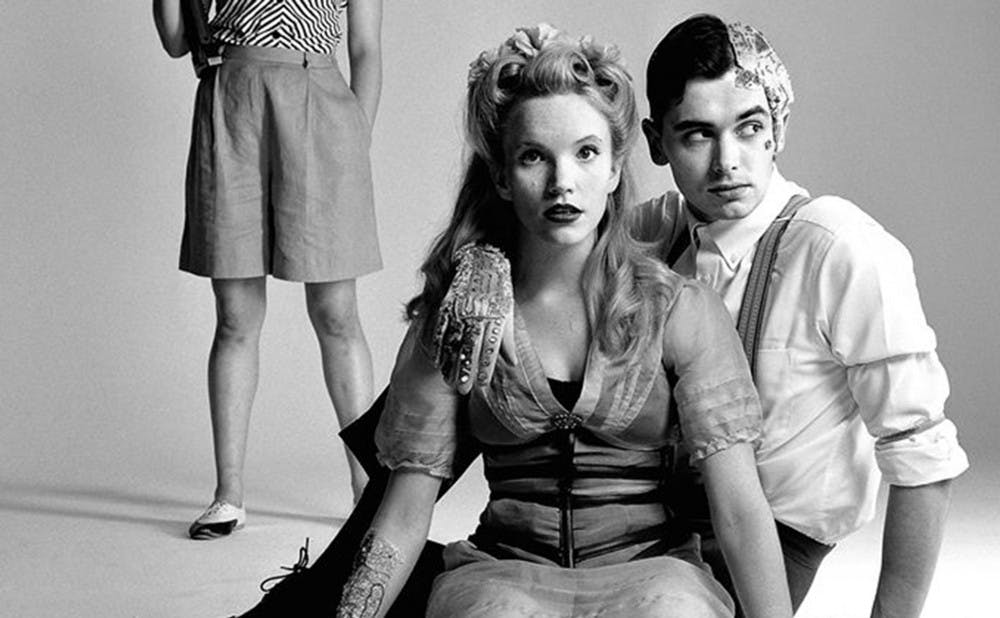For a band whose cultured and crafted songwriting has been traditionally embracing of nostalgia, Belle and Sebastian has taken a surprising but successful step out of their own habits. The 19-year-old Stuart Murdoch-led indie pop band from Glasgow has now had nine albums to show their sound, which bounces from indie pop rock to European nostalgia to cutesy morose folk. Girls in Peacetime Just Want to Dance, their latest album that dropped Jan. 21, is no exception to this undefinability. It’s not vintage Belle, but they’re not exactly trying something new either. Under a new producer and five years removed from their last album, 2010’s Write About Love, the band is aging in reverse to come out with their most pop-infused and dance-obsessed record to date that still plays honest and timeless lyrics.
“The Everlasting Muse” is the track that seems to straddle Sebastian’s new and old sounds the most. With cute, retro lyrics and a second half that sounds like an old TV show’s theme song, it starts out dark and rhythmic as though leading you into a tango. This as well as “Enter Sylvia Plath” and the single “The Party Line” are enough to convince you this is a dance album, even when ignoring the permeating beats on “Perfect Couples” and “Play for Today.” “The Party Line” in particular showcases a little more sinister, removed vocal track under disco-sounding synth, but the lyrics give it a reassuringly stress-free vibe: “Jump to the beat of the party line / There is no one in here but your body dear / Jump to the beat of the party line.”
But after several tracks in a row of new beats and smoothly-synthesized tunes, one might become nostalgic for the offbeat quirk of earlier albums like The Boy With the Arab Strap. The wistful track “Ever Had A Little Faith?” comes as a welcome relief. Murdoch’s voice sits at his lovely almost-whisper just like it did in “A Summer Wasting,” letting harmonies come through in the semi-hopeful tune. “Play for Today,” meanwhile, is just a beautiful song—then Dee Dee Penny from Dum Dum Girls swoops in on leading vocals. It doesn’t fit within their traditional sound, or even the “new” sound on the rest of Girls in Peacetime, but is full of feeling and catchy keyboard pieces.
The album is faithful to the prior sound because Belle didn’t forget about their lyrics. Around the time of their second, masterful album If You’re Feeling Sinister, Murdoch’s songwriting became established in the British lineage of brilliant lyricists. Girls in Peacetime prioritizes the storytelling factor, being honest and kind in telling stories of characters like the eponymous “Allie” and a bedridden Murdoch himself in “Nobody’s Empire.” The latter, a memoir of his struggles as an adolescent with chronic fatigue syndrome, takes pain and makes it power— “Someone sang a song and I sang along / Cause I knew the words from my childhood / Intellect, ambition, they fell away.”
With wrinkles that defined older albums now smoothed out in place of danceability, Girls in Peacetime is undoubtedly a fresh experimentation for the band that’s the same age as most college sophomores. Thankfully, they haven’t tired of creating words and feelings to give their listeners pause. In an interview with Pitchfork last week, Murdoch mused, “I don’t hear that kind of honesty so much in pop nowadays, because it’s so processed. When I used to listen to records in the ‘80s as a teenager—by Morrissey or the Slits or the Raincoats—they were singing to you and telling you stuff about life you didn’t know. It was in the lyrics and it was in the feeling.”
Get The Chronicle straight to your inbox
Signup for our weekly newsletter. Cancel at any time.

